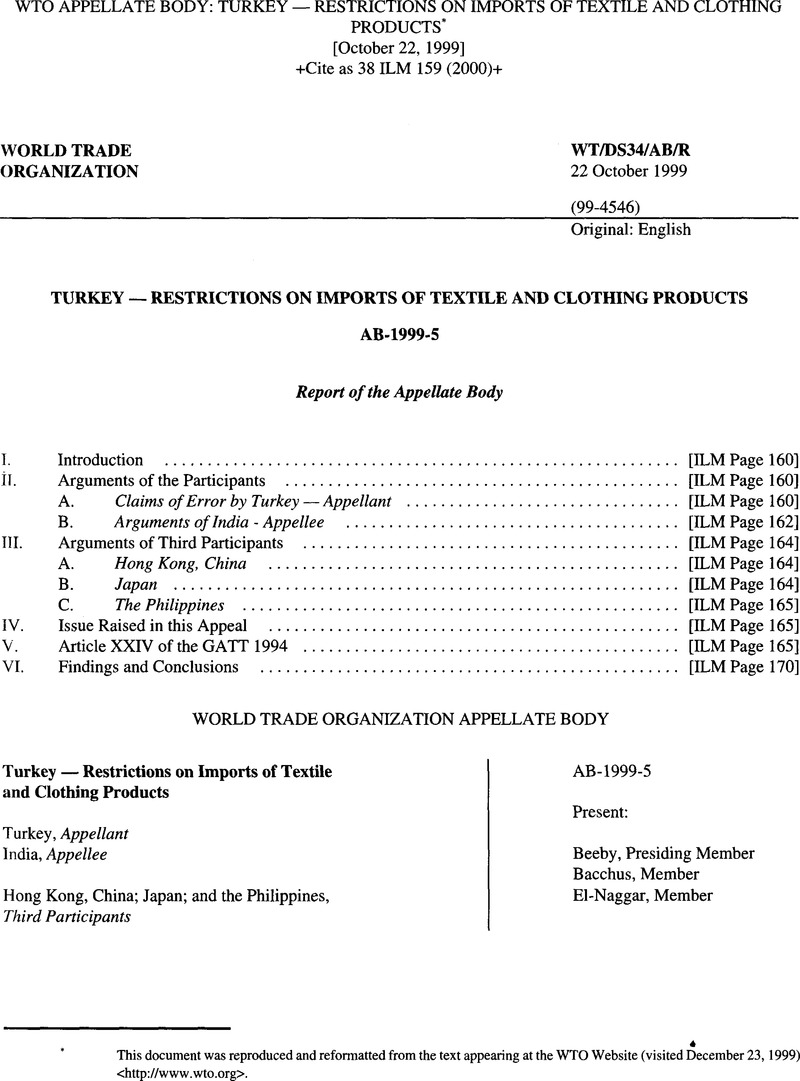No CrossRef data available.
Published online by Cambridge University Press: 27 February 2017

This document was reproduced and reformatted from the text appearing at the WTO Website (visited December 23,1999) <http://www.wto.org>.
1 WT/DS34/R, 31 May 1999.
2 Reproduced in WT/REG22/1.
3 For a further discussion of the underlying facts and a more detailed description of the products involved in this case, see the Panel Report, paras. 2.2-2.46 and 4.1-4.3, and the Annex to the Report.
4 Panel Report, para. 10.1.
5 Pursuant to Rule 21 (1) of the Working Procedures.
6 Pursuant to Rule 22(1) of the Working Procedures.
7 Pursuant to Rule 24 of the Working Procedures.
8 Panel Report, para. 9.134.
9 Understanding on Article XXIV,Preamble.
10 Panel Report, para. 9.86.
11 Ibid., paras. 9.188 and 9.189.
12 “Prevent” is defined as “make impracticable or impossible by anticipatory action; stop from happening.” The New Shorter Oxford English Dictionary (Clarendon Press, 1993), Vol. II, at 2348.
13 We note that legal scholars have long considered Article XXIV to be an “exception” or a possible “defence” to claims of violation of GATT provisions. An early treatise on GATT law stated: “[Article XXIV] establishes an exception to GATT obligations for regional arrangements that meet a series of detailed and complex criteria.” (emphasis added) Jackson, J., World Trade and the Law of GATT (The Bobbs-Merrill Company, 1969), p. 576 Google Scholar. See also Allen, J., The European Common Market and the GATT (The University Press of Washington, D.C., 1960), p. 2 Google Scholar; Dam, K., “Regional Economic Arrangements and the GATT: The Legacy of Misconception”, University of Chicago Law Review, 1963, p. 616 Google Scholar; and Huber, J., “The Practice of GATT in Examining Regional Arrangements under Article XXIV”, Journal of Common Market Studies, 1981, p. 281.CrossRefGoogle Scholar We note also the following statement in the unadopted panel report in EEC — Member States’ Import Regimes for Bananas, DS32/R, 3 June 1993, para. 358: “The Panel noted that Article XXIV:5 to 8 permitted the contracting parties to deviate from their obligations under other provisions of the General Agreement for the purpose of forming a customs union …”. (emphasis added) The chapeau of paragraph 5 refers only to the provisions of the GATT 1994. It does not refer to the provisions of the ATC. However, Article 2.4 of the ATC provides that “[n]o new restrictions … shall be introduced except under the provisions of this Agreement or relevant GATT 1994provisions.” (emphasis added) In this way, Article XXIV of the GATT 1994 is incorporated in the ATC and may be invoked as a defence to a claim of inconsistency with Article 2.4 of the ATC, provided that the conditions set forth in Article XXIV for the availability of this defence are met.
14 Panel Report, para. 9.148.
15 Ibid., para. 9.146.
16 Panel Report, para. 9.148.
17 Ibid.
18 Ibid., para. 9.151.
19 Paragraph 2 of the Understanding on Article XXIV further states that “this assessment shall be based on import statistics for a previous representative period to be supplied by the customs union, on a tariff-line basis and in values and quantities, broken down by WTO country of origin.“
20 In paragraph 43 of its appellant's submission, Turkey argues that this provision must be interpreted as allowing the constituent members of a customs union to introduce GATTAVTO inconsistent quantitative restrictions upon the formation of the customs union. We see no basis for such an interpretation.
21 Panel Report, para. 9.121.
22 Ibid., para. 9.120.
23 Understanding on Article XXIV, Preamble.
24 Panel Report, para. 9.53.
25 Adopted 22 September 1999, WT/DS90/AB/R, paras. 80-109.
26 Panel Report, para. 9.54.
27 Ibid., para. 9.55.
28 Turkey's appellant's submission, para. 56.
29 Panel Report, para. 9.153.
30 Turkey's appellant's submission, para. 56
31 Supra, para. 48
32 Panel Report, para. 9.152.
33 Article 12(3) reads as follows: Until Turkey has concluded these arrangements,the present system of certificates of origin for the exports of textile and clothing from Turkey into the Community will remain in force and such products not originating from Turkey will remain subject to the application of the Communities Commercial Policy in relation to the third countries in question, (emphasis added)